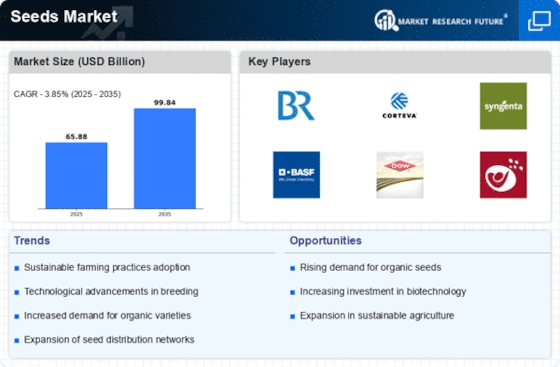Market Share
Seeds Market Share Analysis
Private sector companies have emerged as crucial players in seed production and distribution across the globe, encompassing both developed and developing economies. The sector's rapid growth in recent decades can be attributed to the globalization of trade and the development of biotechnology for plant breeding. Multinational corporations, small-scale enterprises, and medium-sized businesses have established a strong presence in developing economies, particularly in the Asia-Pacific and Latin America regions. For instance, in Colombia, domestic companies account for over 70% of certified vegetable seed production. Recognizing the private sector's growing significance, the Colombian government has implemented policy changes to foster the sector's development.
For example, compulsory regulations governing seed certification and variety releases have been replaced with voluntary ones in Latin America. Additionally, in Brazil, both the private and public sectors collaborate in research and development through the Brazilian Agricultural Research Corporation (EMBRAPA). This public-private partnership facilitates the efficient distribution of high-quality seeds to smallholder farmers, directly contributing to global efforts to achieve food security goals.
Private companies often possess greater financial resources and expertise, enabling them to invest heavily in research and development activities. This investment leads to the development of improved seed varieties with enhanced traits, such as disease resistance, higher yields, and better adaptability to diverse environmental conditions. Private companies can leverage their economies of scale and logistical expertise to streamline seed production and distribution processes. This efficiency ensures that farmers have timely access to high-quality seeds at competitive prices.
Private companies are often more responsive to local market demands and can tailor their seed offerings to suit specific regional preferences and growing conditions. This adaptability ensures that farmers have access to seeds that are well-suited to their local environments and agricultural practices. The private sector's active involvement in seed production and distribution plays a vital role in addressing global food security challenges. By providing farmers with access to high-quality seeds, private companies contribute to increased crop yields, improved nutritional value, and enhanced resilience to climate change impacts. While the private sector plays a crucial role in the seed industry, it is essential to recognize the importance of collaboration between the public and private sectors.
Governments can provide supportive policies, regulatory frameworks, and research funding to facilitate the private sector's contributions. Additionally, public-private partnerships can foster knowledge sharing, technology transfer, and joint research initiatives, further enhancing the effectiveness of seed production and distribution efforts.


















Leave a Comment